There are events by which we remember life and people who change the course of our destiny and consciousness. Likewise, there are theater performances that mark certain times and redefine the concept of an artistic act in us, and in the environment in which they take place, they move the previous scale of experiencing artistic creation.
One such performance - to be remembered by all those who follow theater life in Novi Sad - was 16 years ago at the Sterijino Pozorje Festival. It was called "Fekete ország" (i.e. "Black Land") directed by Arpad Schilling. That fascinating Brechtian structure, which came from Budapest's Kretakor Theater, was a perfectly complex diagnosis of the non-existent lightness of (non-)existence of today's man wrapped in a Kafkaesque centrifuge of impotence before the system. The audience was speechless. And it remained speechless after the paly, long time into the night. Many did not find their way home that night, and some, that same night, found their way to themselves.
Since then, there have been numerous excellent performances in Novi Sad that made the spirit of the audience flutter like birch leaves in the wind, but none - like that Hungarian performance back in 2006, shook this city tectonically.
Until this year, 2022, when one such grandiose performance finally happened again in Novi Sad, which pushed all the limits of human reason and sensitivity. It was "Gerda's Room" of the Osobnyak Theater from Saint Petersburg, directed by Yana Tumina, which, to say the least, was ingeniously played by the fascinating actress Alisa Oleinik. The play was brought to Novi Sad by the first "Novi Sad Theater Festival", an international festival for children and young people organized by the Youth Theatre, Novi Sad.
Primarily thanks to this Russian play, which received the festival's Grand Prix (and was awarded with four other awards: for direction, costumes, scenography and acting), along with the one that arrived from the Finnish Grus Grus Theater, this festival already in its first year presented itself as a notable, new theatrical window to the world. The window which allows us again to become part of the world, in every sense, but only if we make an effort to understand that same world and accept the rules of the game according to which everything functions in it culturally.
Fascinating "Gerda's Room"
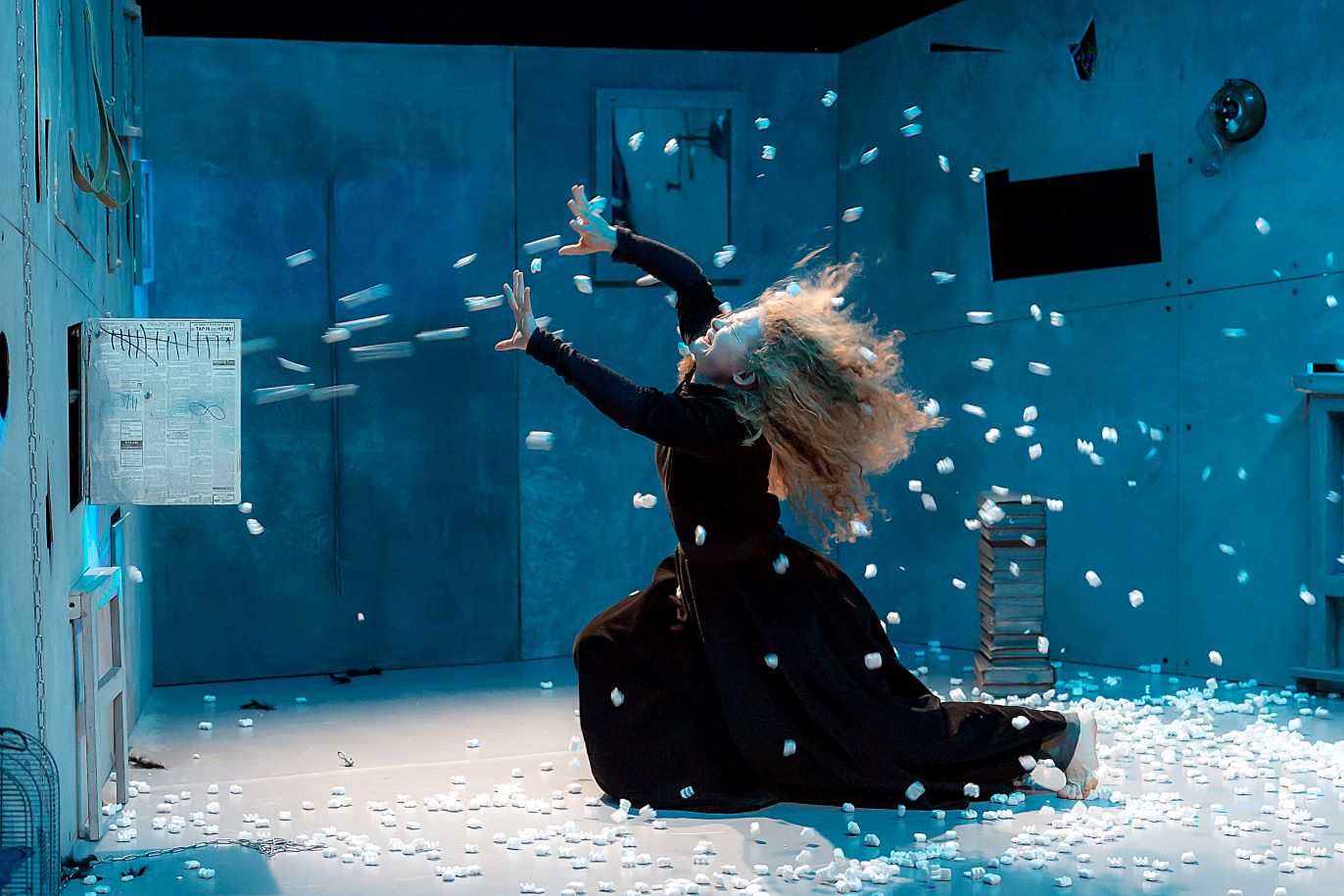 Bearing in mind the fact that there are some things in life, among them some works of art that cannot be understood in words, because even when those words are masterful, they are an unworthy substitute for the emotional effect of the play on a person. Any attempt to verbalize the play "Gerda's Room" is condemned in advance as an insufficiently strong impression to do it justice. And yet, let it be noted...
Bearing in mind the fact that there are some things in life, among them some works of art that cannot be understood in words, because even when those words are masterful, they are an unworthy substitute for the emotional effect of the play on a person. Any attempt to verbalize the play "Gerda's Room" is condemned in advance as an insufficiently strong impression to do it justice. And yet, let it be noted...With her thoughts immersed in Andersen's "The Snow Queen", actress Alisa Oleinik, in collaboration with her colleague Evgeniy Filimonov (his behind-the-scenes work was delivered as precise craftsmanship), created an unreal, wonderful, oneiric world through enchanting images, sounds, music, voice, and movements. who led us with masterly steps to the very epiphany.
Oleinik was Gerda who intelligently and expertly narrated about fear, longing, pain and searching. At a time when everyone would like to erase some of their embarrassing, historical-political, cultural-social faux pas, this play is a rarely honorable example of unrestrained redefinition of the past through the delicate reconstruction of memories.
The arrival of Alisa Oleinik in Novi Sad was – as it turned out - a cultural event par excellence, but also a significant step in raising the local public's awareness of the situation in Russia. Oleinik, otherwise an ardent anti-war activist, was arrested several times in Saint Petersburg (even just before arriving in Serbia) because she demonstrated against the hatred, violence and war between her homeland and Ukraine. For a number of Serbian media, she spoke about how the Russian people are not quite as bellicose towards Ukraine as the pro-state Serbian media tend to claim. On the contrary, there are many people against that senseless war, which in her country cannot even be called a war - it is punishable, but only a "military operation". Despite the draconian Russian laws, and the absence of different tones in the mainstream Russian media, every evening the Osobnyak theater, of which this actress is a part, is lit up in the colors of the Ukrainian flag.
The presence of Russian artists at the "Novi Sad Theater Festival", at the moment of Russian aggression against Ukraine, is actually for another reason - not only solidarity, an exceptional human gesture of The Youth Theater. Russian artists were invited to Novi Sad at a time when the "whole wide world", which can all fit under one computer mouse – and as it seems, to disappear under it, cancels Russian artists and defames Russian culture, punishing even dead Russian writers by insinuating that are pro-Putin's children and one Dostoyevsky, Tolstoy and Chekhov, instead of canceling their shameful politicians who with their unacceptably questionable decisions keep adding to the world's political mess so that the whole world is on the verge of complete madness.
The Russian performance raised the awareness among the audience multifold, and at the same time, made the organizers aware of how poor Serbian theatrical critical thought is. Despite the noticeable media attention to the festival, Serbian critics of the "big media" did not perceive the festival well, so they explained their non-attendance by saying that "Serbian criticism does not follow performances for children and young people". Unfortunately for them, they were deprived of seeing at least two real artistic acts being performed in this, largely parochial, Serbian theater structure, one of which - "Gerda's Room" – is easily brilliant enough to grace the stage in Avignon, Edinburgh or the Berlin Theatertreffen.
Impressive "Invisible Lands"
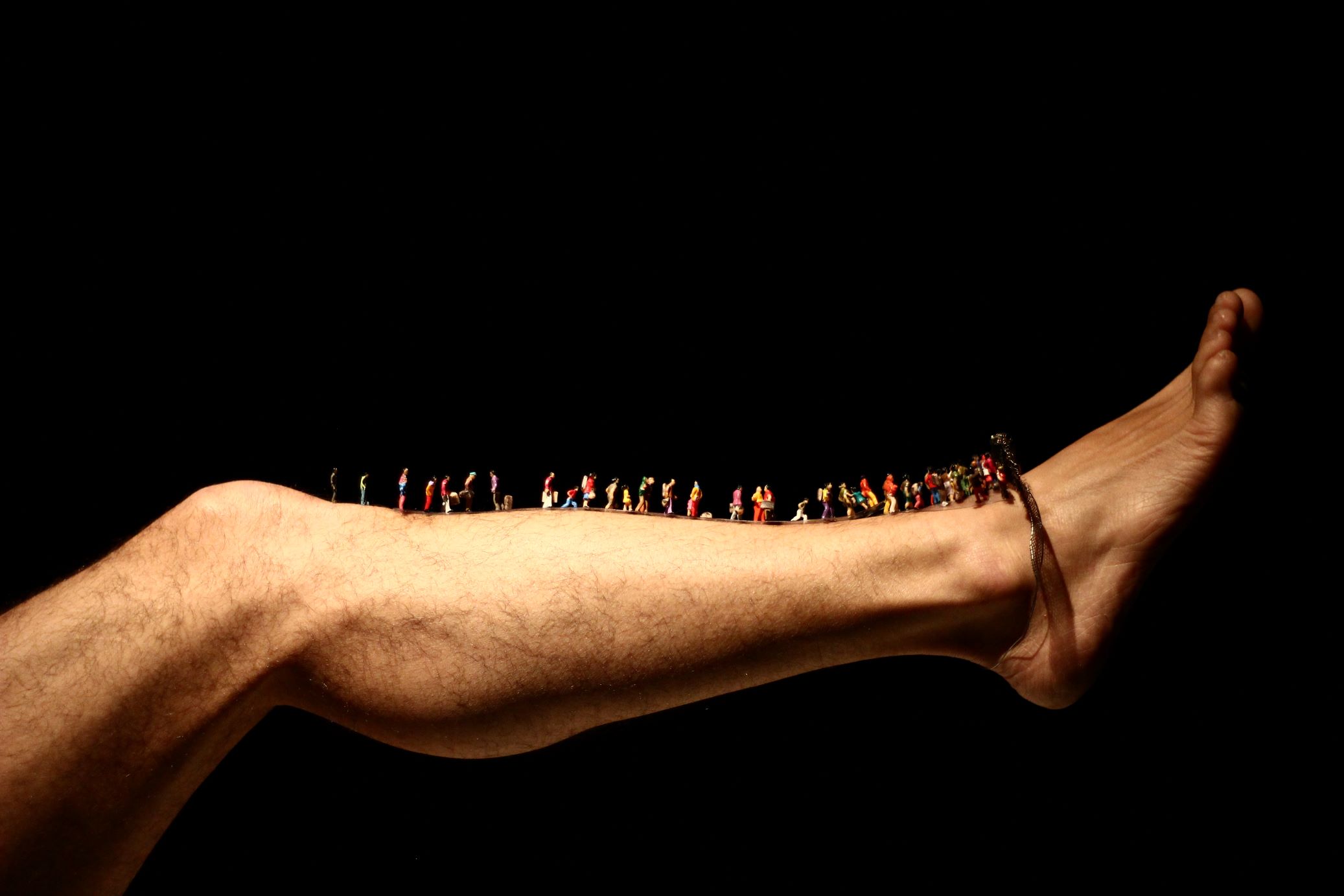 Another show that was the very top of the Festival was the Finnish "Invisible Lands". As well as “Gerda’s room”, this performance, not only through the choice of topic, the treatment of the material, but above all through the performance, pointed out how much our theater - not only for children and young people, but theater in general - lags behind both the world and itself. After the performance, the question remained, why something like this is not possible to deliver in our country. There are rather rare exceptions to the rule (an example is the play "On the Wolf’s Trail" by the Youth Theater). It is not that there are no ideas, it is not that local directors don't know how to work with and deliver twists in their plays (Urban, Mladenovic, Lijesevic), but somehow the end result of those efforts turns an initially excellent idea into a flop.
Another show that was the very top of the Festival was the Finnish "Invisible Lands". As well as “Gerda’s room”, this performance, not only through the choice of topic, the treatment of the material, but above all through the performance, pointed out how much our theater - not only for children and young people, but theater in general - lags behind both the world and itself. After the performance, the question remained, why something like this is not possible to deliver in our country. There are rather rare exceptions to the rule (an example is the play "On the Wolf’s Trail" by the Youth Theater). It is not that there are no ideas, it is not that local directors don't know how to work with and deliver twists in their plays (Urban, Mladenovic, Lijesevic), but somehow the end result of those efforts turns an initially excellent idea into a flop.In fact, the main impression of the Novi Sad Theater Festival is that - at least the best - performances from abroad correspond much better with the world around us and with ourselves, that they are not old fashioned neither in terms of means nor performance, and that - very noticeably - they are not burdened with too many words. Those plays from around the world also indicated that our theater, as well as we are here in the Balkans in general, are suffocating under too many words!!! Performances from around the world choose topics more accurately, carefully and comprehensively approach the material, treat it in a complex manner, manage it expertly, and that's why - in whatever genre, manner, and expression they are delivered, the result is visibly better.
This is also confirmed by "Invisible Lands", which thematizes the broad context of migrant stories. Again, it is not that this topic has not been present in our country, in a series of - unfortunately - mostly senseless theater processes. The author's project of Sandrina Lindgren and Ishmael Falke, who also act in the play, made for the age group over 14, is intended as a way to make young people aware of the world we live in, in which nice notebooks and a new pencil case at the beginning of the school year and clothes as a status symbol are not what the mainstream population of this planet concerns themselves with.
Two authors and actors animate the tiny dolls in an exceptional way, which they transpose onto their bodies with the help of the camera and create an authentic world of our apocalyptic present. Therefore, it is not surprising that the jury of this festival, after precise, comprehensive viewing, awarded the authors of the Finnish play the Special Award for Innovation. The jury included: Bulgarian director Biserka Kolevska, Croatian producer Miran Hajos and Serbian actor Slobodan Ninkovic.
“Kafe Kingdom” and “Silent Boy”
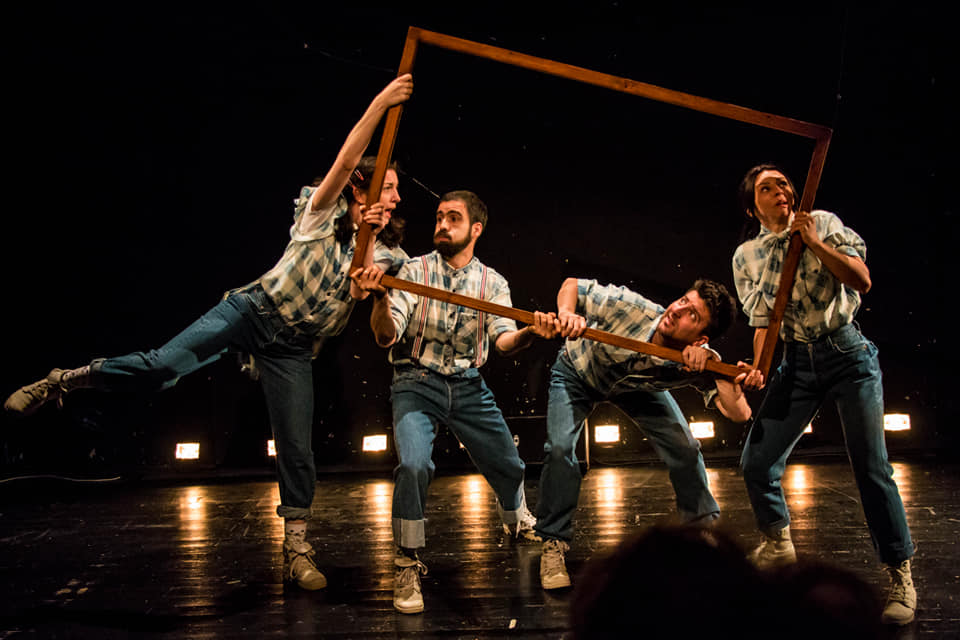 The audience and the jury liked some other performances of this festival which, at least when it comes to the region, achieved, if not production, then certainly artistic and craft standards. Those shows, with their quality, managed to sensitize children and young people to some life-important topics ("Silent Boy"), but also to entertain them ("Cafe Kingdom").
The audience and the jury liked some other performances of this festival which, at least when it comes to the region, achieved, if not production, then certainly artistic and craft standards. Those shows, with their quality, managed to sensitize children and young people to some life-important topics ("Silent Boy"), but also to entertain them ("Cafe Kingdom")."Kafe Kingdom" directed by Vanja Jovanovic is a vivid production that shows the undoubted acting intelligence of two actors - Irena Bausovic Tomljanovic and Dominik Karakasic (both of whom were awarded for their roles in this play. This Croatian play, by combining objects (cups, bottles, jugs, glasses...) and drama in a fun way, deals with the relationship between children and parents, i.e. the need to find a healthy path from the traditional and expected to self-consecration and self-realization.
The "Silent Boy" from Kragujevac, directed by Tin Grabnar, is based on finger play and the principles of platform theater, in which the actor on stage is an actor, a puppet, a stage element, and a prop. The actors of the Kragujevac Children's Theater responsibly performed the touching story about the boy Vuk and the dangers that lurk around a small child's life.
"The Three Musketeers" and "Chrono Dwarfs"
According to some unwritten theatrical law, every festival for children and young people should have carnival elements, an entertaining and relaxing part – that would tickle the youngest and slightly older audience with theatrical thoughts. In this context, at the "Novi Sad Theater Festival", the hilarious "Three Musketeers" was played, which was charmingly performed by the actors of the Czech theater Alfa from Pilsen in a ferocious rhythm, all with the scenography falling apart at some point.
Before Novi Sad, this show recorded its carnival life on three continents, in as many as 35 countries, making it the most successful Czech show in the 21st century. The puppet version of the legendary novel by Alexander Dumas was performed by Czech artists with comic guignol dolls and in an internationally understandable sign language.
The Slovakian "Chrono Dwarfs" directed by Jakub Maksimov was performed in a slightly less exuberant tone, but the actors from Bratislava, although less extravagant than their Czech colleagues, demonstrated their authentic story of friendship and rebellion in a luxurious space of imagination, in the form of a puppet cinema. It was, to put it most accurately, an adventurous and philosophical story about the ravages of time, the imperative of rebellion - today more than ever, because today - more than ever - we are being euthanized by the stupidities of new media reality.
About other performances of the Festival: "Mahmud" of the Ptuj Municipal Theater/Slovenia, "Chaplin" of the Puppet Theater Košice/Slovakia, "Seven Ravens" of the Children's Theater of the Republika Srpska/Bosnia and Herzegovina, "The Emperor's New Suit" of the Herceg Novi Theater and JUK Hercegfest Herceg Novi/ Montenegro and the "Emperor's New Clothes" of tandem Puppet Theater Maribor/Slovenia and City Puppet Theater Rijeka/Croatia - on another occasion.
Let me ask you...
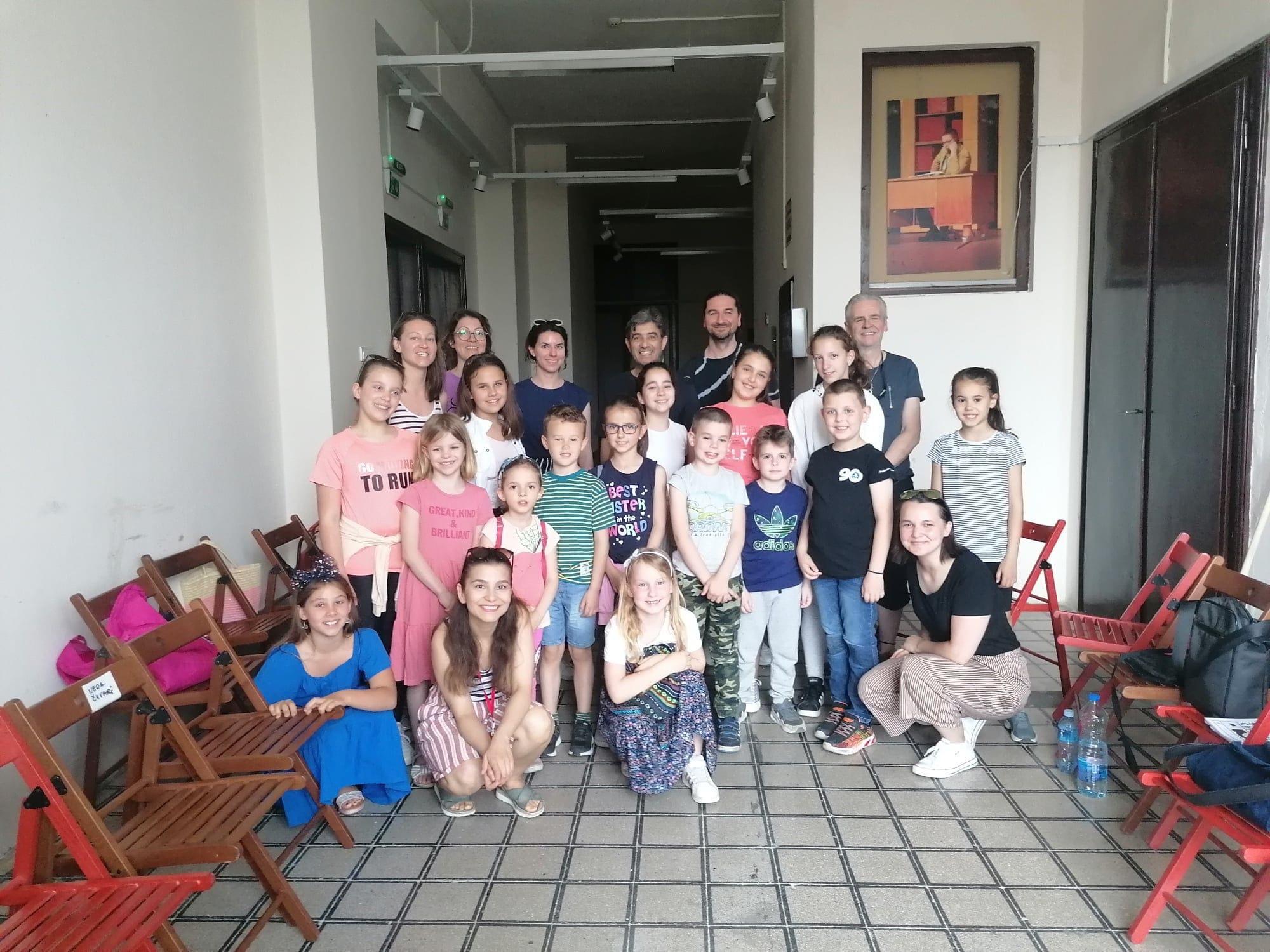 "Novi Sad Theater Festival" also hosted daily "Young Critics" workshops, in which children of primary school age from the Drama Studio of the Youth Theater participated. They were prepared for this program by the two top notch actresses of this theater, Neda Danilovic and Slavica Vucetic. After each performance, guided by the expert hand of the moderator, playwright Divna Stojanov, the children talked to the authors and actors of the plays about what they had seen. Children's curiosity and inquisitiveness often opened up the workshop's guests better than any journalist's questions or critics' views.
"Novi Sad Theater Festival" also hosted daily "Young Critics" workshops, in which children of primary school age from the Drama Studio of the Youth Theater participated. They were prepared for this program by the two top notch actresses of this theater, Neda Danilovic and Slavica Vucetic. After each performance, guided by the expert hand of the moderator, playwright Divna Stojanov, the children talked to the authors and actors of the plays about what they had seen. Children's curiosity and inquisitiveness often opened up the workshop's guests better than any journalist's questions or critics' views.Beginning and end
The best part of theater Europe that creates for children and young people was seen in part in May, 2022 in Novi Sad - in the Youth Theater, at the "Novi Sad Theater Festival". According to the selector and director of the festival, Mihajlo Nestorovic, that was the goal of the first Festival, for the young Novi Sad audience to see performances that were or still are among the most awarded in their home countries, to gain insight into various, for example, puppetry techniques, to understand what is going on in the world, what is the theater like in some countries about which we know almost nothing (like Finland, for example).
"Novi Sad Theater Festival" opened and closed with the premiere of two performances by the festival host. At the beginning, there was a lavish, glamorous street performance of "Gulliver’s Travels", directed by Kokan Mladenovic, which entertained and delighted hundreds of children in the center of Novi Sad, not only on the day of the premiere, but also in the pre-premier rehearsal days. This play, as well as "Metamorphoses" by Sasa Latinovic, performed in honor of the award winners, which showed in its own way how an original work of art can be created with the help of one material (twine), will remain in the repertoire of the Youth Theater.
To metamorphoses through understanding
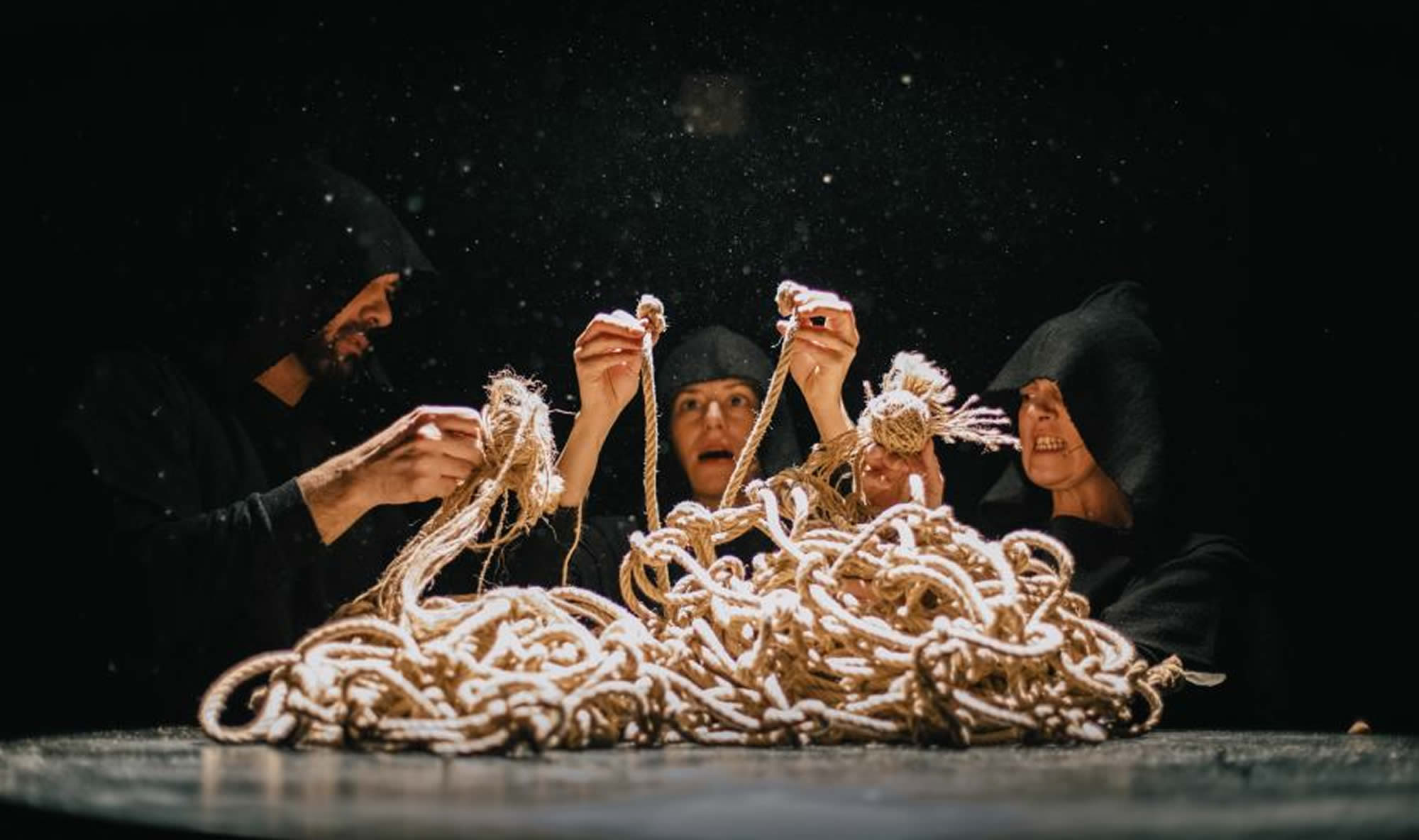 Every era likes to destroy old myths and create new ones. It does this by examining its past in order to make its present better, wanting at the same time to prevent mistakes that may arise on the way to the future. And the future, that's what today's man is madly rushing towards. Philosophers would say - that they shouldn't, because the individual future is actually death. But death is not the worst thing in the future. The worst thing would be if, in this general acceleration without meaning and order, we managed to overtake the present and thus outplay the future. This is precisely what, if we thought about them a little more deeply, the best performances of the "Novi Sad Theater Festival" talked about in various ways. Those plays, and the "Novi Sad Theater Festival" pointed out several things: we should choose the right pace, the right topics and the right people around us. Only in such contexts are works of art created and festivals held so that they contribute to the development of an overall environment.
Every era likes to destroy old myths and create new ones. It does this by examining its past in order to make its present better, wanting at the same time to prevent mistakes that may arise on the way to the future. And the future, that's what today's man is madly rushing towards. Philosophers would say - that they shouldn't, because the individual future is actually death. But death is not the worst thing in the future. The worst thing would be if, in this general acceleration without meaning and order, we managed to overtake the present and thus outplay the future. This is precisely what, if we thought about them a little more deeply, the best performances of the "Novi Sad Theater Festival" talked about in various ways. Those plays, and the "Novi Sad Theater Festival" pointed out several things: we should choose the right pace, the right topics and the right people around us. Only in such contexts are works of art created and festivals held so that they contribute to the development of an overall environment.Paraphrasing the explanation from the program for the already mentioned "Metamorphoses", as a kind of summary of everything that has been said, we could conclude the following: we have seen enough of what kind of sacrifice there could be for the sake of great love and what kind of crimes unfulfilled expectations are capable of. It is time to turn to each other, to get to know each other and recognize that our similarities are greater and more important than our differences. Only at that moment of realization will any one of us, as a human being, be capable of metamorphosis. Hopefully, the performances at the next "Novi Sad Theater Festival" will tell us further stories about them.
Snezana Miletic



